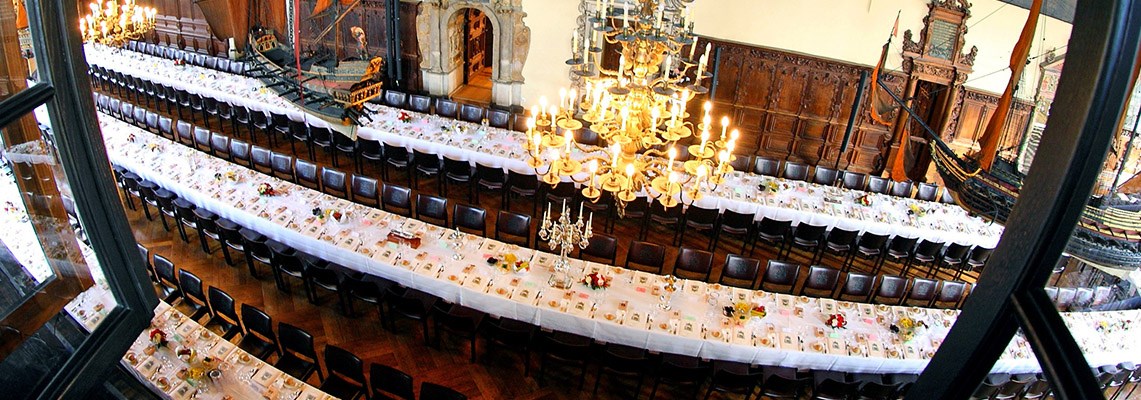Summary
The Administrating Chairman calls: “Schaffen, Schaffen unnen un boven unnen un boven Schaffen!”
With this old call from Bremen, which told the seamen on board of the ships that food was being served, the Administrating Chairman gives the starting signal for the Schaffermahlzeit.
Exactly to the minute, the doors to the upper hall of the Bremen Town Hall swing open and to the sound of Richard Wagner’s “Tannhäuser” the way is clear to the festively decorated table.
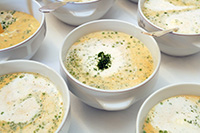
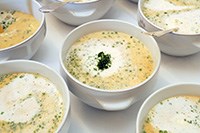 Bremen chicken soup
Bremen chicken soup
The Schaffermahlzeit begins with a chicken soup. This reflects the notion of where Bremen took its origin: long and wearisome discussions about the start of all things are avoided in Bremen through the story of the broody hen - complex recipes with the results of the local cuisine.
First speech of the first Schaffer
The first Schaffer on behalf of the three merchant and six sea captain Schaffer welcomes the participants of the Schaffermahlzeit and thanks the Senate and Mayor as host of the upper hall of the Bremen Town Hall.
First speech of the second Schaffer on the Federal President and the mother country
3rd verse of the German national anthem
In the national anthem, some 300 men’s voices swear to unity and justice and freedom as a pledge of happiness.
Stockfish, mustard sauce and boiled potatoes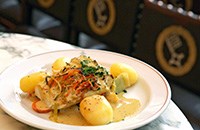
The dish of stockfish alludes to one of the most important and oldest of Bremen’s trade goods, salted cod. The festival of the “HAUS SEEFAHRT” is unthinkable without the symbolic eating of stockfish.
First speech of the third Schaffer on Bremen and the Senate
Seafarer’s Beer
Originally only beer was drunk at the Schaffermahlzeit, a strong top fermentation beer. The Seafarer’s Beer brewed especially for the Schaffermahlzeit, a malt beer, today serves for each participant to drink to the guest of the banquet sitting opposite him in a ritual manner from large silver beakers.
Second speech of the first Schaffer on trade, shipping, and industry
Borecole, Pinkel sausage, salted and smoked pork, sweet chestnuts and fried potatoes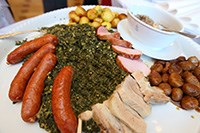
A typical dish from Bremen comes onto the table of the Schaffermahlzeit with Brown Cabbage and Pinkel sausage. The chestnuts that are served with this hark back to the days when potatoes were unknown and had still not found their way into the succession of courses.
Second speech of the second Schaffer on “HAUS SEEFAHRT”, Chairmen and Senior Aldermen
Collection speech of the Administrating Chairman - Collection for “HAUS SEEFAHRT”
Part of the tradition of the Schaffermahlzeit is that after the speech to “HAUS SEEFAHRT”, those present are requested in the collection speech of the Administrating Chairman to make a donation for the charitable foundation. It is not only widow’s mites that disappear into the shining brass alms boxes. Not a word is lost about the amounts donated - that too is tradition.
Roast veal, celery salad, Catharine plums, steamed apples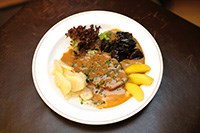
With the roast veal and regional vegetables a further dish is served that according to old bills of fare belonged to a feast and which - with the exception of the roast meat - could still be cooked from supplies remaining at the end of the winter season.
Speech of the captain Schaffer on the merchant Schaffer as hosts
The speech of the sea captain Schaffer is addressed to the merchant Schaffer as hosts and to the three Schaffer.
Second speech of the third Schaffer on this year’s sea captain Schaffer
The third Schaffer presents the six new sea captains Schaffer to the assembly. The sea captain and the merchant are two sides of one coin. Their partnership characterizes the symbiosis between trade and shipping and is the basis on which “HAUS SEEFAHRT” is founded
Third speech of the first Schaffer on the external guests
Speech of thanks of the Administrating Chairman on the officiating Schaffer
The Administrating Chairman thanks this year’s three new merchant Schaffer for organising the Schaffermahlzeit and for bearing the costs.
Riga flounder, anchovies, Chester and cream cheese
Almost at the end, the participants in the Schaffermahlzeit once again enjoy fish. The predilection of the merchants and ship-masters for Riga flounder, a smoked plaice, could go back to the Bremen’s trading relations with the Baltic area dating from the Middle Ages.
Captain's Speech on shipping and merchants
Speech of the Guest of Honour
Words of thanks of the Administrating Chairman on the Guest of Honour
Church warden clay pipes and tobacco
After the meal it is an old custom to fill the long white church warden clay pipes bearing the coat of arms of the “HAUS SEEFAHRT” with tobacco and to envelope the banqueting hall in a blue haze - and smoke detectors and anti-smokers have done nothing to change that. Bremen was a tobacco city. Besides trade in tobacco, the processing of tobacco also became an important activity. Together with the colonial product, the long Dutch pipes came over from the Netherlands.
Coffee/Mocha
A hot and strong mocha coffee ends the rich bill of fare of the Schaffermahlzeit. Bremen merchants and ship-masters have for centuries been accustomed to the invigorating drink. Their ancestors brought the brown beans to Bremen, set up a coffee shop in the merchants’ guild, the Schütting, and did not wish to forgot this pleasure at their fraternity meal.
The Guest of Honour in conversation with the young people
Seafarers’ Ball with ladies and dancing
After hours of sitting, now there is movement in the festive meeting when, after all have risen from the table and following the talks between young men and women from Bremen and the Guest of Honour, the celebrations continue together with the ladies to music and dancing.

